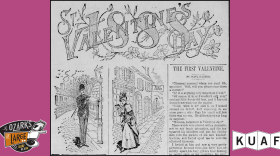Classes are underway for many public schools in the region, and college classes will begin soon. While every college campus will have students in physics, literature and economics classes this fall, only one in Arkansas will have students enrolled in piping — bagpiping.
Lyon College in Batesville has a long tradition of Scottish music and pipes. The college also offers free piping and drumming lessons to people between the ages of 8 and 18 on Tuesday evenings.
To learn more about the Lyon College Pipe Band, made up of students, faculty and staff, we spoke with Ken Nadler, director of advancement for Scottish Heritage at Lyon College.
He says the Lyon College Pipe Band can feature between seven to 15 pipers at any time, as well as a few drummers. Nadler, who before going to Lyon worked at the University of Arkansas, says, though Batesville is only about 11,000 people, Lyon College has had a strong pipe band for a long time.
Nadler: We recruit kids that hopefully will come here and play with us. Sometimes we get more experienced players. There are pipe bands all over the United States and around the world, and we’ve had a couple of kids from Scotland and Ireland in the program. We’ve had kids from all over the United States, as far away as New Hampshire, Washington state and Florida. We get a lot from Oklahoma, Texas and some from Arkansas.
Like me, I started out in Northwest Arkansas playing with the Ozark Highlanders. I learned to pipe in 1990 — 1995 is when I started — and then I moved to Batesville in 1998 because I’d come over here several times for the Scottish festival. I liked the town, I liked the college. Although I was very happy in Fayetteville — I loved it there and I loved my job at the university — this band was just too compelling and I had to come over and play with them. So I’ve been here for the last 27 years.
KK: And you’re making sure that another generation, if interested, can learn.
Nadler: Yes, we do. We teach and have taught successfully a number of kids here from the local area. One of the guys that plays with us right now started out here as a student when he was about 13 or 14 years old. He decided not to come to college. He became an electrician’s apprentice and got married, but he still comes and plays with the band. He’s from Searcy. His brother is also a student piper. He’s got another brother who played bass for us for a while, and his sister is a drummer. The whole family at one point was coming to play with us. We do beginning lessons in piping and drumming. When we have a dance instructor, we do Highland dance.
KK: What’s a good age, not necessarily for percussion, but for the pipes? The pipes take a lot.
Nadler: It’s really not as physically demanding as people think. But it takes focus and dedication. We’ve started kids as young as 6 and 7. I like to stick to around 8 years old — they’re a little easier to keep from being distracted, and they’re more focused in their energy. That’s the hardest part of piping and any other musical instrument. It takes a lot of self-discipline. You have to dedicate about 20 minutes a day at least to practicing. We start with very simple rudiments and build on those. Everything is foundational. You start with easy stuff like a G gracenote on a basic scale, then build up to very complex embellishments over time.
When I started piping with the Ozark Highlanders, I started in September and I was on the bagpipe by the end of December. But I was practicing constantly. You start on a practice chanter, which is like the bagpipe with just the mouthpiece and the chanter where you do the fingering — no bag and no drones. Once you learn the basics, the 17 or 18 basic embellishments, and how to play some tunes, then we put them on a bagpipe. Then we show them how to manage it — it’s kind of like juggling. Once you know how, it’s easy. I’ve stood out on the Plaza de Saint Catherine in Bordeaux, France, and played for an hour and a half without stopping, never letting the pipe go down and never repeating a tune. It’s not as demanding physically as people think once you know how to control it and have a good setup. For a little kid, it’s different. We’ve had some who were very small.
We have a piper who is now coming into her sophomore year here at the college, who started with us when she was about 12 years old, then matriculated into the pipe band and the college. She’s studying pre-veterinary and plans to go to our new vet school when she graduates. She’s under 5 feet tall, and the pipes she bought were bigger than she was, but you can work things out — and she has.”
KK: In those beginning lessons, once someone gets to the pipes, do they have their own set or do you have pipes students can learn on?
Nadler: Depending on financial circumstances, we generally will find a practice chanter for them if they don’t have one and can’t afford one. We encourage them to buy their own instrument, because having personal investment makes you more interested in becoming proficient. You also don’t want your mouth on somebody else’s practice chanter. We encourage them to buy their own chanter, then pipes. That’s different — they’re expensive. An average set of Blackwood bagpipes used these days can start around $750 and go up from there. A brand new set from a reputable pipe maker might start around $1,500. We have some sets that have been donated to the program over the years, and we do loan them out. In some cases, we’ve sold those pipes to people at a substantial discount from what they’d pay new or even used. But ideally, you’d have your own instrument.
KK: Are there piping scholarships?
Nadler: Yes. In the past, we used to give out full academic scholarships to several pipers every year. That was still happening when I got here in 1998. Over the years, the financial structure changed, and now we primarily give endowed scholarships. I established an endowed scholarship when my dad died 20 years ago, the Leonard Adler Memorial Scholarship. We’re now establishing two new endowed scholarships through a generous gift — the Robert Lewis Campbell Scholarship and the Dr. Renate Rosenthal Scholarship.
We also have some clan scholarships — Scottish clan associations around the country donate money to us every year. Clan Campbell, Clan MacLeod, and Clan Sinclair in St. Louis have been generous. They’re not huge — sometimes $1,000 a year to a student — and they get a couple thousand from the college for being part of this co-curricular program. There is a fairly substantial amount of money available, but we don’t do the full academic anymore. That’s offered to pipers, drummers and Highland dancers.
KK: I know this isn’t your role, but I’m going to ask something general about Lyon — new football stadium, vet school, dental school. What’s going on in Batesville?
Nadler: We’re small, but we’re mighty. Our president, Dr. Taverner, is a great person — bright, intelligent, engaging. I think that speaks for everyone. Everyone in the cabinet is intelligent and deeply involved in the process of liberal arts education and what that represents. We’re all here to support the mission. When everyone is pushing together for the same thing, you accomplish things. Even though we’re not a large school, we have one of the best academic records in the state. We’ve got a unique Scottish heritage program, we host the Arkansas Scottish Festival, and we’re very visible.
Jimmy and I are getting ready to go to Little Rock on the 13th to be on TV in the afternoon on KATV. We’re always out there, waving the Scottish flag and the Lyon College tartan banner.
KK: Is there any place where people can go online and hear the band?
Nadler: If you Google Lyon College Pipe Band, a lot pops up from various competitions around the country. On the Lyon College website, under ‘About,’ there’s a link to the Scottish Heritage Program, and there may be some video there. I handle the Scottish Arts summer school page, so I know that’s current. You can find video pretty easily.
KK: Thanks so much for talking with me, and continued great success with the program.
Nadler: Thank you for having me. I hope to see you back in November at the Arkast Awards.
KK: I should tell people about Celtic Crossroads.
Nadler: I do a Celtic music podcast every Friday night. It drops at 6 p.m. Central time. You can find it on YouTube, and there’s a Facebook page. The program was made possible by a gift from the Robert Lewis Campbell estate. He left us 4,000 CDs of Celtic music from his time hosting a Celtic radio program in Memphis. I wanted to keep his legacy alive, so I started the program, playing music from his collection and mine. It’s eclectic — next week I’m playing a Celtic Pink Floyd version of ‘Comfortably Numb’ and a poem called ‘Mid-term Break.’ I include spoken word every week.
New episodes air every Friday at 6. Archives are on YouTube, and I post links on the Celtic Crossroads Facebook page about every couple of weeks. You can go back about a year and a half — we just finished program number 84 yesterday.
KK: Congratulations on that, and best wishes for the school year.
Nadler: Thank you. We’re excited. We’ll have the new freshmen in next week. We’ll be doing matriculation and playing for them. We have a new piper from Springfield Public Schools in Missouri. She was in the Kilties Drum and Bugle Corps, which performs for us at the Arkansas Scottish Festival. She liked it here and wanted to come, so now she’s joining the pipe band. The week after next, she’ll be out there playing in the old Lyon tartan kilt.
Ozarks at Large transcripts are created on a rush deadline. Copy editors utilize AI tools to review work. KUAF does not publish content created by AI. Please reach out to kuafinfo@uark.edu to report an issue.








